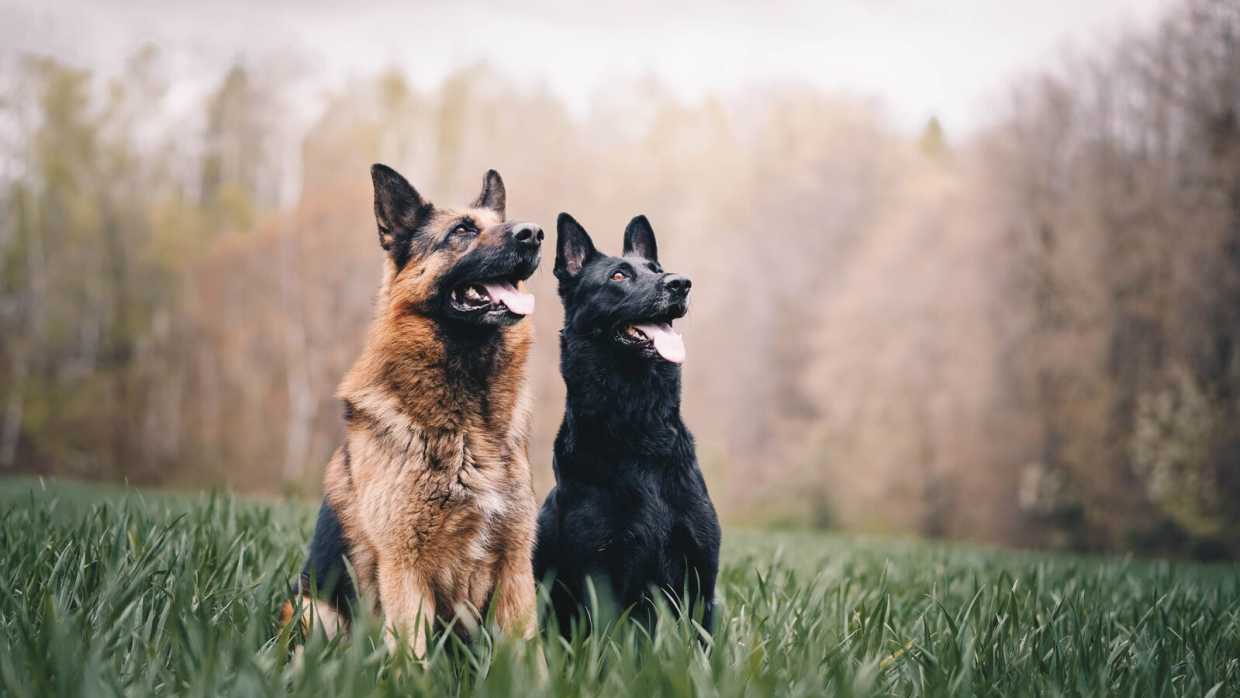German shepherds are a high-energy dog breed with lots of muscle that will play all day if you let them. This high energy comes from their original purpose as sheep herding dogs, bred in Germany in 1899 by Max von Stephanitz. Stephanitz thought German Shepherds were everything a dog should be; intelligent, loyal, hard-working and beautiful.
While no longer sheep herders, German Shepherds maintain high energy levels and muscle mass. Because of this, they are often used in police forces worldwide or as guard dogs. This breed requires proper nutrition, including protein, fats, and carbohydrates from healthy sources to maintain their health.
Dog Nutrition for German Shepherds
As large, active dogs, German Shepherds require lots of protein and carbohydrates to build muscle and maintain energy levels. Adult German Shepherds need roughly 20-25% protein in their diet and should look at protein sources such as chicken, beef, fish, lamb, turkey or eggs. For example, wild caught salmon dog food can provide all the protein your German Shepherd needs to maintain muscle mass.
German Shepherds also benefit from 10-15% fat, which helps keep their coats shiny and healthy and maintain nerve, muscle and cell function. While many people give their dogs high-fat treats, other foods, such as cooked dog food, can provide the high-quality fats necessary to keep your German Shepherd healthy.
When looking for carbohydrates in your German Shepherd’s diet, stick to barley, rice, and oats. These are easy to digest and provide the energy your dog needs to be playful throughout the day. Avoid foods with corn, wheat or soy as they are harder to digest and offer less nutritional value.
German Shepherd Health Risks
Like any dog, tailoring the food to the dog’s breed, age and health is essential. German Shepherds suffer from various health risks, such as osteoarthritis and digestive problems. Like other dogs, they can also have an allergy to proteins, such as chicken.
Best Food for German Shepherds with Sensitive Stomachs
If your German Shepherd has a sensitive stomach, it may dislike specific food types. Try switching to healthy wet dog food if you typically use dry food. This change may settle your dog’s stomach and prevent further complications. Open Farm uses foods that are 100% human-grade ingredients to give your dog the very best quality for its digestive health.
Best Food for German Shepherds with Allergies
For German Shepherds with allergies, check the ingredients of all foods and treats before you buy them. If your dog cannot have one type of protein, try another, but make sure it is high-quality and ethically sourced, so your dog still receives all the benefits and nutrition it needs. Open Farm carries a variety of protein sources for your dog, such as beef, turkey, salmon, chicken, whitefish, lamb and venison.
Best Food for German Shepherds with Joint Problems
A common issue in German Shepherds is joint problems through hip or elbow dysplasia. One way to help with this is to take advantage of the benefits of bone broth for dogs. Bone broth improves joint health and strengthens tendons and ligaments to help your German Shepherd remain mobile and healthy. Open Farm carries chicken, turkey and beef bone broth for your pet’s joint health and overall well-being.
Feed Your German Shepherd Dog Food with Premium Ingredients
The German Shepherd is a regal dog breed that deserves the highest quality food on the market. Open Farm carries a variety of wet, dry and freeze dried dog food that meets the unique dietary needs of German Shepherds.
Our food contains humanely sourced beef, lamb, chicken and fish, healthy fats from sources like coconut oil and whole grains like oats, barley, rice and millet to ensure the health of your German Shepherd for years to come.
Shop our sustainable, high-quality dog food to give your dog the nutrition they need to stay healthy and happy.
Disclaimer: This article is meant only as an example meal with fully balanced nutrition, please reach out to our customer experience team if you have any questions about your pet's own unique circumstances! To ensure these products are a good fit for your pup, we also recommend consulting your pup’s vet about any new supplement or diet changes, especially if there is a medical concern. They should be able to help as you and your vet know your pup’s medical history best!
